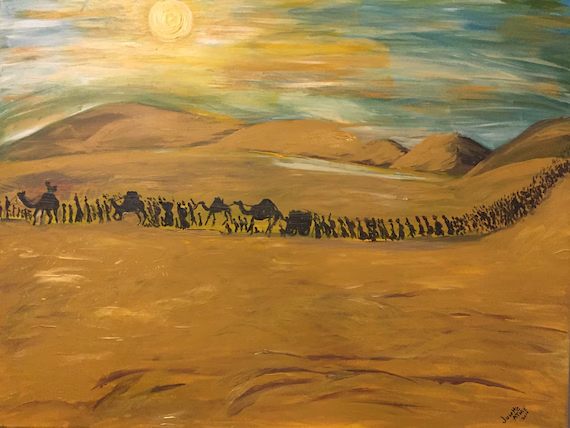Elisha and Naaman
Elijah was growing old, and knew he had not long to live. Elisha went with him on his last journey. When they had crossed the Jordan River, Elijah said. 'I shall leave you soon.
What would you like me to give you?
Elisha replied. 'I'll carry on your work alone. Leave me your power. That is a hard thing to do, but if you see me when I go, then you will know that you've been given what you asked for, said Elijah.
At that moment, a fiery chariot drawn by fiery horses swept between them. There was a great gust of wind, and Elisha saw Elijah being taken up to Heaven.
Elisha knew then that he had been given the power he had asked Elijah for. Sadly, he picked up Elijah's cloak which had fallen to the ground, and went away to continue Elijah's work.
Naaman was the commander of the Syrian army. He was a brave soldier and a rich man with a big house and lots of servants, but he had a horrible skin disease, called leprosy.
Naaman's wife had a new slave, a young girl who had been captured by the Syrians during a raid on Israel.
She said to Naaman's wife, 'If Lord Naaman, would go to the prophet Elisha in Israel, I know he would be cured of his disease.
When his wife told Naaman what the girl had said, he asked the King of Syria for permission to go to Israel.
The King gave him a letter for the King of Israel so that Naaman could travel safely through the country.
Naaman rode off in his chariot with many servants, and lots of money and clothes. When he reached Elisha's house, a servant came to the door. My master says you must go to the Jordan, and wash seven times in the river. Then you will be cured, said the servant.
Naaman was furious. 'Why won't Elisha come to see me? He shouted. 'I thought he'd call on his God and I would be cured.
Why must I wash in the Jordan? There are better rivers in Syria.
Angrily, he started to drive away in his chariot, but one of his servants stopped him. 'My master.' said the servant, 'if Elisha had asked you to do something difficult, you would have done it.
As he only says you should wash in the Jordan, shouldn't you try it?
Naaman realized that the servant was right. He drove to the Jordan and washed in it seven times. When he walked out of the river, his skin was clear and smooth. He was cured of the disease.
Delighted. Naaman rushed back to Elisha to thank him. 'I know now that there is only one true God, he said.










Comments
Post a Comment